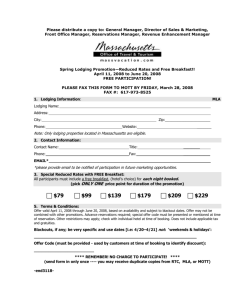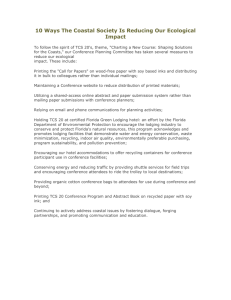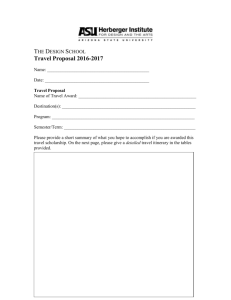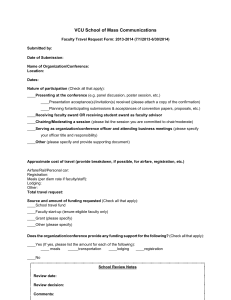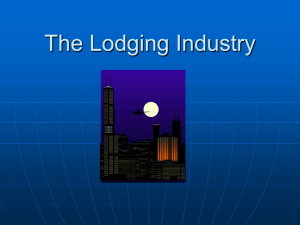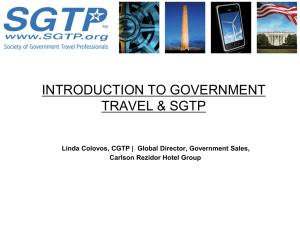HTM*2100, Winter 2012
advertisement
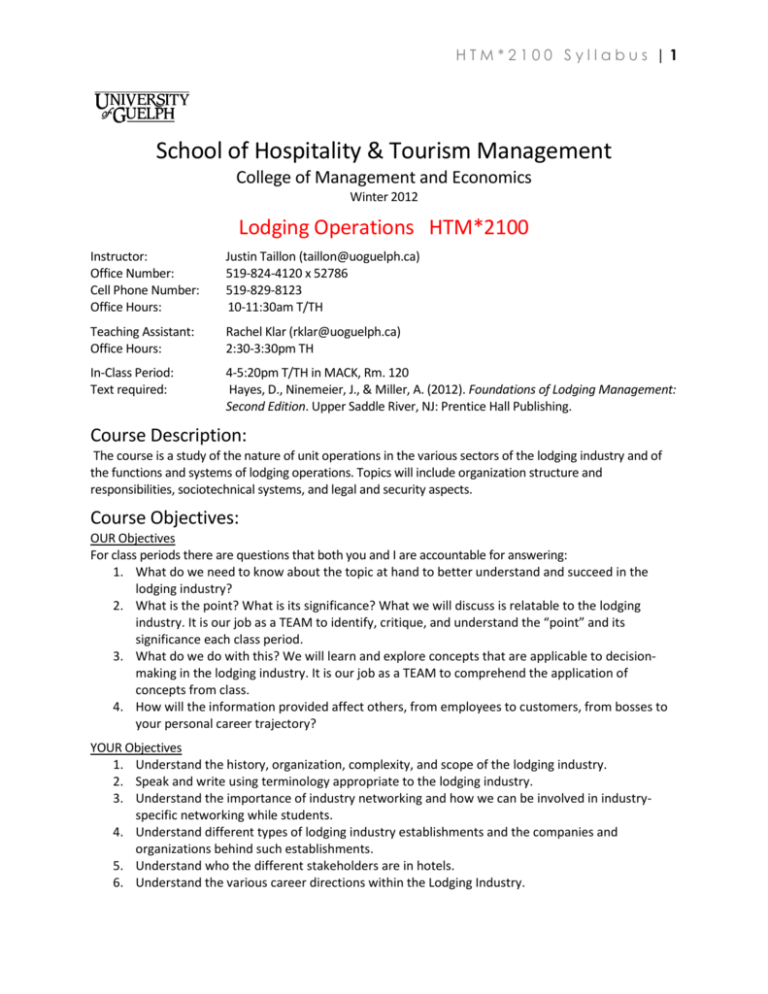
HTM*2100 Syllabus |1 School of Hospitality & Tourism Management College of Management and Economics Winter 2012 Lodging Operations HTM*2100 Instructor: Office Number: Cell Phone Number: Office Hours: Justin Taillon (taillon@uoguelph.ca) 519-824-4120 x 52786 519-829-8123 10-11:30am T/TH Teaching Assistant: Office Hours: Rachel Klar (rklar@uoguelph.ca) 2:30-3:30pm TH In-Class Period: Text required: 4-5:20pm T/TH in MACK, Rm. 120 Hayes, D., Ninemeier, J., & Miller, A. (2012). Foundations of Lodging Management: Second Edition. Upper Saddle River, NJ: Prentice Hall Publishing. Course Description: The course is a study of the nature of unit operations in the various sectors of the lodging industry and of the functions and systems of lodging operations. Topics will include organization structure and responsibilities, sociotechnical systems, and legal and security aspects. Course Objectives: OUR Objectives For class periods there are questions that both you and I are accountable for answering: 1. What do we need to know about the topic at hand to better understand and succeed in the lodging industry? 2. What is the point? What is its significance? What we will discuss is relatable to the lodging industry. It is our job as a TEAM to identify, critique, and understand the “point” and its significance each class period. 3. What do we do with this? We will learn and explore concepts that are applicable to decisionmaking in the lodging industry. It is our job as a TEAM to comprehend the application of concepts from class. 4. How will the information provided affect others, from employees to customers, from bosses to your personal career trajectory? YOUR Objectives 1. Understand the history, organization, complexity, and scope of the lodging industry. 2. Speak and write using terminology appropriate to the lodging industry. 3. Understand the importance of industry networking and how we can be involved in industryspecific networking while students. 4. Understand different types of lodging industry establishments and the companies and organizations behind such establishments. 5. Understand who the different stakeholders are in hotels. 6. Understand the various career directions within the Lodging Industry. HTM*2100 Syllabus |2 7. Apply the successful managers’ philosophy: “You are the only reason for everything that happens to you” throughout the entire semester. INSTRUCTOR Objectives I am responsible for providing you with the tools and capabilities to complete assignments and answer the aforementioned questions. Furthermore, I am accountable for the following: Making students feel welcome and invited in the classroom. “Coaching” to promote success in the classroom. Being empathetic to your needs. Being enthusiastic about the material being covered. Completing tasks in a timely manner. If you are failing to meet your goals during the semester I will not hesitate to let you know. If I fail to meet my goals during the semester please do not hesitate to let me know. Participation Participation in the classroom is necessary for learning to occur in this class. Therefore, you are expected to participate in class. If you fail to participate in class I will assume you are not prepared. If you are consistently not prepared for class I will request a meeting with you. Participation is 15% of your grade. Class participation will include staying abreast of current news stories as they relate to the Lodging Industry and discussing them in class during “Water Cooler Talks”, being an active participant in class, reading course materials that are assigned, dressing appropriately when guest speakers are present, and other activities and topics deemed necessary throughout the semester. Participation will be gauged primarily through Top Hat Monocle. Monocle Computer Assisted Teaching (monocleCAT) is a classroom response technology that allows you to answer questions and interact in the lectures and seminars in real time via your laptop, smart phone, cell phone, or other web-enabled device such as an iPad. The subscription fee is $20/term or $38 for five years and allows you to use it for multiple courses over the time of the subscription. Subscription keys are available at the university bookstore or directly on the Top Hat Monocle website at http://www.tophatmonocle.com/register/. Once registered, the site for HTM*2100 is http://www.tophatmonocle.com/e532422. You can text responses to: (647) 724-4217. If you are in dire financial need and cannot afford a subscription, please contact me no later than Jan. 26th and I will negotiate with Tophat Monocle about getting you complimentary access to their system. If you do not wish to the pay the fee, the weight (15%) can be transferred to your three exams (no added to points to the Final Exam) ---to exercise this option, you must notify me in writing no later than Jan. 26th. Finally, although this is a large class, I will be able to identify certain individuals who deserve additional participation points, and some who should have participation points taken away. This will be based upon interactions in class, via email, and at events related to class. I reserve the right to alter your Participation grade by up to 8% of your final grade plus or minus at the end of the semester. If I choose to take away more than 2.5% of your Participation marks I will request a meeting with you and offer you an opportunity to explain your actions during the semester. Cell Phones, Food, Etcetera You are expected to respect your peers and me. Cell Phones should be turned off before class begins. You may bring a drink to class with you. Food, including gum, is not permitted. If you foresee a circumstance where your cell phone must be left on or you must eat during the class period please speak with me. HTM*2100 Syllabus |3 Assignment Protocols: Introduction There will be three types of Assignments: A Report, a Presentation, and Exams. Assignment Due Dates February 2 – Exam #1 March 6 – Exam #2 March 29 – Exam #3 April 20 – Final Exam (8:30-10:30am) *Presentation is TBA *Report is TBA Assignment Grading Table 1. Grade Breakdown Assignment Midterms Final Exam Hotel Report Hotel Report Present. Participation TOTAL Table 2. Letter Grades No. 3 1 1 1 1 %/ea. 14 20 15 8 15 Total Letter Grade Percentage 42 20 15 8 15 100 A+ A AB+ B BC+ C CD+ D DF >90% 85-89 80-84 77-79 73-76 70-72 67-69 63-66 60-62 57-59 53-56 50-52 0-49 Assignment Explanations: Presentation “If you can do a half-assed job of anything, then you’re a one-eyed man in a kingdom of the blind.” Your group will provide a 6-8 minute presentation about your hotel organization at the beginning of class, after the Water-Cooler Talk. The hotel organization will be chosen at random out of a hat in class on January 17. Thus, groups are random. The information presented about each hotel organization is up to each individual group. I would like to see creativity and a focus on providing information to the students, rather than a summarization of information and/or reading from paper or a PPT. You are being graded solely on the style of the dissemination of information, the interest of the information to the class, and the content of the information. Report “Effort is only effort when it begins to hurt.” Two hard copies and an electronic copy (email in ONE Microsoft Word) of the Report are due by the beginning of class on the due date (except for the groups presenting Jan. 24 & 26, whose Reports will be HTM*2100 Syllabus |4 due January 31). I will not consider an assignment received until I and the Teaching Assistant each receive a hard and electronic copy. Your entire group will lose 20 points for an assignment not received by the deadline. All Reports must contain the following information: Title Page, Table of Contents, Executive Summary, Introduction, Company Background, Ownership and Organizational Structure (historical and current), Analysis including pictures for each flag in the brand (description, market segment, type of clientele, inroom and property amenities, number of properties), Perceptual Map (price and perceived luxury of the property’s flags) Reward Program Information, Franchising Information, Personal Analysis (from each group member), a Reference Page (not cited information, but rather a collection of 10-20 excellent sources of information about the company), Grade Sheet (signed by all members), and any additional information about the organization that the group finds interesting. You can receive extra points for creativity as long as you meet the stated minimum requirements! Exams “My morning choices are having a good tussle. Procrastination was winning, but make your bed and good breakfast just kicked his butt.” The Midterm Exams will consist of approximately twenty-five M.C. and seven Short Answer questions. The Final Exam will consist of approximately thirty-five M.C. questions and twelve Short Answer questions. You are responsible for ensuring you do not have final exam timing conflicts. Extra Credit Opportunities “We lack resolve and blame fate, mistaking the drift for the tides.” If you are an active member of a professional organization in the hotel industry this semester you can receive a maximum of 4% added to your final grade in this course (receiving the full four points is rare and would require extraordinary efforts including a leadership role, attendance at a conference, etc). More likely, 1-3% would be added to your final grade for normal membership in an organization. To receive the Extra Credit you will need to: Get the organization approved by me (HAC & HFTP are automatically approved); Complete the Extra Credit sheet posted on the course website; and turn the Extra Credit sheets in at the Final Exam. Academic Integrity Academic misconduct is behaviour that erodes the basis of mutual trust on which scholarly exchanges occur, undermines the University’s exercise of its responsibility to evaluate students’ academic achievement or restricts the University’s ability to accomplish its learning objectives. The University of Guelph is committed to upholding the highest standards of academic integrity and requires all members of the University community to be aware of what constitutes academic misconduct and to do as much as possible to prevent academic offences from occurring. All information you should know about academic integrity at the University as it applies to this course can be found here: http://www.open.uoguelph.ca/prospective/distance-education/academic-integrity.aspx Furthermore, I reserve the right to use Turn It In, a website that detects plagiarism, at any time during the semester for any of your assignments. Please visit turnitin.com or see me for more on this resource if you have questions about how the website functions as it relates to this course. HTM*2100 Syllabus |5 Table 3. Lectures, Readings, Exams, and Assignments Outline Date 10-Jan 12-Jan 17-Jan 19-Jan 24-Jan 26-Jan 31-Jan 2-Feb 7-Feb 9-Feb 14-Feb 16-Feb 21-Feb 23-Feb 28-Feb 1-Mar 6-Mar 8-Mar 13-Mar 15-Mar 20-Mar 22-Mar 27-Mar 29-Mar 3-Apr 5-Apr Topic Go over Syllabus, Schedule, Expectations, and Assignments Networking: Guest Speakers: HAC and HFTP Introduction to the Accommodation Sector Organizational Structure Measuring Hotel Successes Guest Service Guest Speaker: Trevor Wynne-Jones EXAM #1 Guest Speaker: Peter Oliver Management / Niche Market Hotels Staffing & Career Trajectories NO CLASS No Class - Winter Break No Class - Winter Break Operations: Front Desk, PBX, Concierge, & Bellmen Operations: Housekeeping EXAM #2 Guest Speaker: Andrew di Tomasso Sales & Marketing Accounting & Revenue Management Food Service, Catering, & Banquets Guest Speaker: Barry Ward Consulting in the Lodging Industry EXAM #3 Safety & Security Hotel Certification & Sustainability Readings and Assignments Terminology p. 1-20 Organizational Structure, 21-43 Benchmarking 44-64 EXAM #1 65-88: Oddities Organizational Structure, 89-112, 333-362 119-122, 137-146 176-202 EXAM #2 147-169 278-306, 123-136 SKIM: p. 227-277 STR Reports, PKF Report, 170-174 EXAM #3 218-219, 307-332 Sustainability

